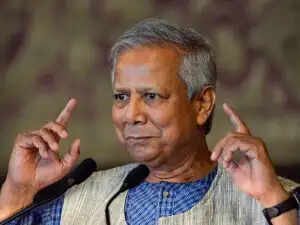Bangladesh's Muhammad Yunus Appeals to Trump: A Call to Delay Tariff Hike
Yunus Urges Trump to Reconsider Tariff Measures

In a recent letter addressed to US President Donald Trump, Muhammad Yunus, who serves as the Chief Advisor of Bangladesh's interim government, has requested a three-month delay on the implementation of new reciprocal tariffs affecting the country's exports to the United States.
The Trump administration has increased tariffs on Bangladeshi goods to 37%, up from an average of 15%. This change significantly impacts Bangladesh's primary export, Ready-Made Garments (RMG), which constitutes a substantial portion of the nation's $8.4 billion annual exports to the US.
Currently, American products face an average tariff of 74%, but the Trump administration has applied a 50% reduction for Bangladesh, resulting in the new 37% tariff rate, according to local news sources.
Despite a significant drop in global stock markets, Trump has defended his tariff policies, asserting that world leaders are eager to negotiate these reciprocal tariffs.
Bangladesh's economy has been on a downward trajectory since the interim government took office in August 2024, facing severe liquidity issues that have led to the closure of numerous businesses.
Political instability has further complicated international trade, prompting global retailers to seek alternative partners. Local entrepreneurs are struggling to import essential raw materials for their operations.
Additionally, widespread protests and strikes among garment factory workers over unpaid wages and poor working conditions have intensified across the nation. Reports indicate that these protests have resulted in factory closures and have tragically led to injuries and fatalities among workers.
A report from Prothom Al, a prominent Bengali daily, highlights that key economic indicators such as revenue collection, inflation, unemployment, private investment, and foreign investment are all showing troubling trends.
The Dhaka-based Centre for Policy Dialogue (CPD) has emphasized that without political and institutional stability, attracting both domestic and foreign investments will remain a challenge.
